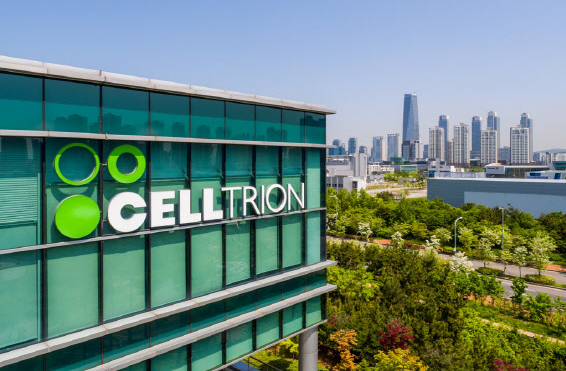Celltrion to expand biosimilar portfolio to 11 by 2025
It will strengthen its product lineup by applying for approval for 5 follow-up biosimilars until end of 2023
By Jun 13, 2023 (Gmt+09:00)
LG Chem to sell water filter business to Glenwood PE for $692 million


KT&G eyes overseas M&A after rejecting activist fund's offer


Kyobo Life poised to buy Japan’s SBI Group-owned savings bank


StockX in merger talks with Naver’s online reseller Kream


Meritz backs half of ex-manager’s $210 mn hedge fund



South Korea's biopharmaceutical company Celltrion Inc. announced on Tuesday that it plans to beef up its portfolio by applying for regulatory approval for five additional biosimilars by the end of the year.
By May 2023, Celltrion had already submitted approval applications for two of these follow-on biosimilars. The company reported that it had lodged a European application for its CT-P43, a biosimilar of Janssen's Stelara, in May, and for the CT-P39, a biosimilar of Omalizumab in April.
Plans are underway for a US approval application for CT-P42, a biosimilar of Regeneron’s ocular drug, Eylea, set for the first half of this year.
Further down the pipeline, clinical development is progressing apace. Last month, Celltrion forwarded a clinical trial plan to both European and US regulatory authorities for phase 3 trials of its CT-P53, a biosimilar of the multiple sclerosis medication, Ocrevus.
In other development milestones, the company's CT-P41, a biosimilar to Amgen Prolia, and the CT-P47, a biosimilar of the rheumatoid arthritis medication Actemra, are currently in phase 3 trials. Celltrion aims to expedite these clinical trials and wrap up the approval application process by year-end.
Securing these five additional biosimilar pipelines could potentially grant Celltrion access to a new market worth 50 trillion won ($39 billion), augmenting the 50-trillion-won market already tapped by the firm's six existing products. This could see Celltrion targeting a total global market of 100 trillion won ($78 billion).
Observers note that the firm's diversification strategy could bolster its competitive edge in the global biosimilar market. Through building an expansive product portfolio, Celltrion may significantly enhance synergy effects in its distribution process.
Write to Jeong Min Nam at peux@hankyung.com
-
 Bio & PharmaCelltrion to develop Humira biosimilar oral medication with US firm
Bio & PharmaCelltrion to develop Humira biosimilar oral medication with US firmJun 05, 2023 (Gmt+09:00)
1 Min read -
 Bio & PharmaCelltrion’s Remsima SC praised in Europe as preferred biosimilar
Bio & PharmaCelltrion’s Remsima SC praised in Europe as preferred biosimilarJun 02, 2023 (Gmt+09:00)
2 Min read -
 Bio & PharmaCelltrion unveils phase 1 clinical data of Actemra biosimilar in Europe
Bio & PharmaCelltrion unveils phase 1 clinical data of Actemra biosimilar in EuropeMay 31, 2023 (Gmt+09:00)
1 Min read -
 Bio & PharmaCelltrion gets FDA approval for Humira biosimilar CT-P17
Bio & PharmaCelltrion gets FDA approval for Humira biosimilar CT-P17May 24, 2023 (Gmt+09:00)
1 Min read -
 Bio & PharmaCelltrion applies for Phase 3 clinical trials in Europe for biosimilar
Bio & PharmaCelltrion applies for Phase 3 clinical trials in Europe for biosimilarMay 03, 2023 (Gmt+09:00)
1 Min read -
 Bio & PharmaS.Korea's Celltrion Healthcare launches Vegzelma in US
Bio & PharmaS.Korea's Celltrion Healthcare launches Vegzelma in USApr 17, 2023 (Gmt+09:00)
1 Min read


